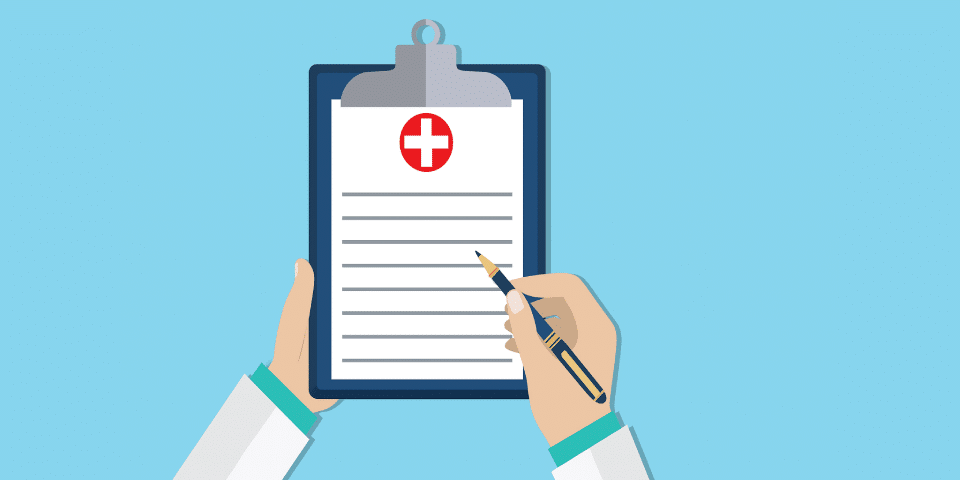Updated July 2, 2025
How to Handle Doctor’s Note Requests
Can an employer require a doctor's note for one day of absence? This question plagues countless employees who find themselves needing a single sick day but face demands for medical documentation.
Despite the common belief that employers have unlimited authority to request medical proof, the reality is more nuanced. Under California law, employers must follow specific guidelines when requesting medical documentation, particularly for brief absences. California sick leave provisions offer certain protections against excessive documentation requirements, although employers retain some discretion in their attendance policies.
Whether you're facing pressure to provide medical proof for a 24-hour bug or wondering if your company's sick leave policy crosses legal boundaries, understanding your rights is essential. In this article, we'll examine when employers can legally request doctor's notes, what information they're entitled to receive, and how you should respond if you believe your privacy or workplace rights are being violated.
California Sick Leave Laws and Doctor’s Notes
Under California law, specifically the Healthy Workplaces, Healthy Families Act of 2014, employees are entitled to paid sick leave. When using sick leave:
- Employer Rights: An employer may request reasonable documentation, such as a doctor’s note, only after three consecutive days of absence. Requesting a note for a single day of sick leave is generally discouraged unless abuse is suspected.
- Employee Privacy: Employers cannot require disclosure of the medical condition or details about the illness. A simple confirmation that the employee was under medical care is sufficient.
- Timing and Cost: If documentation is required, employers must allow reasonable time to obtain it and may not impose undue hardship (e.g., paying for expensive documentation out-of-pocket).
- Protected Leave: Under CFRA (California Family Rights Act) or FMLA (Family and Medical Leave Act), if the leave qualifies, employers may require a medical certification, but it must comply with specific privacy and notice regulations.
Best Practices for Employers
- Request doctor’s notes only when permitted (e.g., prolonged absence).
- Avoid blanket policies requiring documentation for all sick days.
- Ensure policies are applied uniformly to prevent discrimination claims.
Let’s Dive Deeper into The Laws
Employers possess legal authority to request doctor's notes in various circumstances, though this power isn't unlimited. Understanding the legal boundaries helps both employers and employees navigate medical absence documentation appropriately.
Sick leave policies and documentation rules
Many employers establish sick leave policies that outline when medical documentation is necessary. Generally, companies have flexibility to create reasonable documentation requirements, provided they apply these policies consistently across all employees.
The question of whether an employer can require a doctor's note for one day of absence often depends on state law. For instance, California's Healthy Workplaces, Healthy Families Act prohibits employers from requiring a doctor's note for absences of three days or less. However, in many other states, employers maintain the right to request documentation even for brief illnesses.
Company size and industry also impact documentation requirements. Small businesses with fewer than 15 employees typically have more flexibility in their sick leave policies than larger corporations. Moreover, certain industries with strict safety protocols (such as healthcare or food service) often maintain stricter documentation requirements due to public health concerns.
If your employer's attendance policy specifies that a doctor's note is required for any absence, they generally have the legal right to request this documentation regardless of duration. Nevertheless, the policy must be applied consistently to avoid claims of discrimination.
FMLA and extended leave requirements
The Family and Medical Leave Act (FMLA) establishes clearer guidelines for medical documentation. Under FMLA, employers can require certification from a healthcare provider for qualifying serious health conditions.
For FMLA eligibility, employees must:
- Work for a covered employer (private employers with 50+ employees or public agencies)
- Have worked for the employer for at least 12 months
- Have accumulated at least 1,250 hours of service during the 12 months before leave
Furthermore, when employees request FMLA leave, employers may request medical certification within 15 calendar days. This certification can verify the existence of a serious health condition and its expected duration. Employees who fail to provide requested certification might have their FMLA leave denied.
ADA and accommodation-related requests
The Americans with Disabilities Act (ADA) creates additional considerations regarding medical documentation. When an employee requests workplace accommodations due to a disability, employers may request reasonable documentation that:
- Verifies the existence of a disability
- Explains the need for requested accommodations
Nevertheless, the ADA limits what information employers can request. They cannot demand complete medical records or information unrelated to determining appropriate accommodations. The documentation request must be specifically tailored to verify disability status and accommodation needs.
Additionally, the ADA applies differently than sick leave policies. While an employer might legally request a doctor's note for a single sick day under their attendance policy, the ADA's documentation requirements only activate when an employee requests accommodation or when the employer has objective reason to believe a medical condition might affect job performance or workplace safety.
The Equal Employment Opportunity Commission (EEOC) provides guidance on medical inquiries, specifying that employers should limit health-related questions to those that are "job-related and consistent with business necessity." This standard helps protect employee privacy while allowing employers to obtain necessary information.
Understanding these different legal frameworks helps clarify when your employer can legitimately request medical documentation and what information they're entitled to receive.
What Employers Are Allowed to Ask
When medical documentation enters the workplace, understanding the boundaries between necessary verification and privacy invasion becomes crucial. Unlike the broad authority to request notes, employers face significant limitations on what information they can actually demand.
Basic information vs. detailed diagnosis
Employers must respect the balance between verification needs and medical privacy. The law permits employers to request only enough documentation to substantiate:
- Verification that a healthcare provider examined the employee
- Dates the employee should refrain from working
- Basic information about work restrictions or accommodations
- Confirmation the employee is not contagious (in specific environments)
Conversely, employers cannot demand detailed medical records or specific diagnostic information. According to multiple legal frameworks, a doctor's note can only state that a physician examined the employee on a certain date and time, along with the dates the employee should avoid work due to illness. Any additional details risk violating patient confidentiality laws.
Indeed, the Americans with Disabilities Act (ADA) restricts employers from requesting information about disabilities or inquiring about their severity unless directly related to job functions. Even for accommodation requests, documentation should only verify disability status and explain accommodation necessity—nothing more.
HIPAA protections and consent requirements
Many employees mistakenly believe HIPAA (Health Insurance Portability and Accountability Act) prevents employers from requesting doctor's notes entirely. In reality, HIPAA primarily governs healthcare providers, not employers. As clarified by the Department of Health and Human Services, "Your employer can ask you for a doctor's note or other health information if they need the information for sick leave, workers' compensation, wellness programs, or health insurance."
Subsequently, HIPAA does establish important boundaries. Healthcare providers cannot disclose your medical information to employers without your explicit authorization. This means:
- Doctors cannot provide detailed diagnoses to employers without patient consent
- Any additional information beyond basic verification requires written authorization
- Employers contacting healthcare providers directly must have employee permission
The "minimum necessary" rule applies—healthcare providers should include only essential information to certify the medical condition or absence without disclosing specific details. Furthermore, all medical information obtained about an employee must be collected and maintained separately from regular personnel files.
Fitness-for-duty certifications
For employees returning after medical leave, employers may request fitness-for-duty certifications. These documents verify an employee can safely resume work, particularly after extended absences or for safety-sensitive positions.
Under FMLA regulations, employers can require fitness-for-duty certifications only under specific conditions:
- The policy must be applied uniformly to all similarly-situated employees
- The requirement must be clearly stated in the FMLA designation notice
- The certification can only address the particular health condition that prompted the leave
Above all, employers cannot delay job restoration while seeking clarification on fitness-for-duty certifications. According to Department of Labor regulations, "no second or third opinions on a fitness-for-duty certification may be required."
For intermittent absences, employers generally cannot require certification for each occurrence. However, if reasonable safety concerns exist, certification may be requested up to once every 30 days. This standard applies when employers have "a reasonable belief of significant risk of harm to the individual employee or others."
Understanding these boundaries helps employees navigate documentation requests while protecting their medical privacy rights.
What Employees Should Know About Their Rights
Knowing your workplace rights regarding medical documentation empowers you to protect your privacy and health simultaneously. Even as employers maintain certain authority to request doctor's notes, you have significant legal protections worth understanding.
Your right to medical privacy
Under the Health Insurance Portability and Accountability Act (HIPAA), your medical information receives substantial protection. Healthcare providers cannot disclose your medical details to employers without your explicit consent. Consequently, doctors must limit information in absence notes to the minimum necessary details—typically just verification of examination and recommended time off.
Most importantly, employers cannot require you to disclose specific diagnoses or detailed medical histories to supervisors or coworkers. Any medical information collected must be stored separately from your regular personnel files to maintain confidentiality.
In fact, doctors' notes should contain only information relevant to your absence, not your complete medical history. Even when you provide consent for documentation, the "minimum necessary" principle applies—only essential details should be shared.
When to refuse excessive requests
Recognizing when employer requests cross legal boundaries is crucial. You can justifiably refuse requests that:
- Demand detailed medical histories unrelated to your current condition
- Require disclosure of specific diagnoses (except for ADA accommodation purposes)
- Request complete medical records rather than targeted documentation
- Involve frequent or unnecessary documentation for minor illnesses
If your employer requests excessive information, firstly explain which aspects you believe exceed legal limits. Document all communication about these requests, as this paper trail may prove valuable later. Remember that refusing excessive medical documentation is not the same as refusing to provide any documentation—clearly distinguish between the two in your communication.
How to handle retaliation or discrimination
Employers cannot legally retaliate against employees for taking medical leave or requesting reasonable accommodations. Signs of potential retaliation include:
- Demotion or reduction in hours following a medical absence
- Denial of promotions or opportunities after requesting accommodations
- Threats related to employment status after providing medical documentation
- Hostile work environment following disclosure of medical conditions
If you experience retaliation, document every incident thoroughly with dates, times, and witnesses. File a complaint with your HR department as a first step, then escalate to external agencies if necessary. The Equal Employment Opportunity Commission (EEOC) or state labor agencies can investigate discrimination claims.
For serious violations, consulting with an employment attorney might be necessary. Remember that anti-discrimination laws protect you from adverse actions related to medical leave or accommodation requests, therefore preserving your right to appropriate working conditions without fear of punishment.
Common Scenarios and How to Respond
Navigating workplace attendance situations requires understanding how documentation requirements apply to different scenarios. Let's examine common situations and appropriate responses for both employers and employees.
One-day absence and employer discretion
Regarding single-day absences, employers typically maintain discretion to request documentation. In essence, federal regulations don't explicitly prohibit employers from asking for a doctor's note for one day off. Private employers often establish their own sick leave policies, including documentation requirements for short absences.
Typically, employers request doctor's notes after three consecutive days of absence, yet some companies may require documentation even for half-day sick leave. If your employer's attendance policy clearly states that medical proof is required for any absence, they generally have the legal right to request it. To address this professionally, ask your manager, "Could you clarify the sick leave documentation policy? Does it apply to every one-day absence?" This opens a constructive conversation without confrontation.
Frequent short absences
Patterns of absences—especially those occurring before or after weekends and holidays—often trigger employer scrutiny. The Portland Sick Time Ordinance defines suspicious patterns as "repeated use of unscheduled sick time on or adjacent to weekends, holidays, vacation, or pay day." Similarly, San Francisco's ordinance considers it suspicious when absences coincide with previously denied vacation requests or undesirable shifts.
In cases where patterns emerge, employers may justifiably request additional information or direct employees to an independent medical examination. As a reasonable response, document legitimate reasons for your absences and consider discussing flexible scheduling options if recurring medical appointments are necessary.
Returning after surgery or chronic illness
For employees managing chronic conditions or returning after surgery, different protocols apply. Approximately 60% of American adults have at least one chronic health condition that requires ongoing management. Employers should foster compassionate cultures that help employees manage their health while maintaining productivity.
Upon return, employers may request fitness-for-duty certifications verifying your ability to safely resume work. Consider scheduling a meeting with your manager before officially returning to discuss any needed accommodations or schedule modifications. Requesting reduced hours initially can facilitate a smoother transition back to full responsibilities.
Handling suspected abuse of sick leave
Occasionally, employers must address suspected sick leave abuse. Signs include consistent absences around weekends/holidays or absences after denied vacation requests. If an employer suspects abuse, they should:
- Document patterns of absence
- Conduct a private conversation with the employee
- Request appropriate documentation
- Consider progressive disciplinary measures for confirmed abuse
Remember that consistent application of sick leave policies is crucial to avoid discrimination complaints. Ultimately, both employers and employees benefit from clear communication about absences and documentation expectations.
What to Do If You Think Your Rights Are Violated
Facing violations of your workplace rights regarding doctor's notes demands swift, strategic action. When an employer oversteps boundaries by demanding excessive medical documentation for brief absences, having a clear response plan is essential.
Start with HR and internal policies
Initially, review your employee handbook to understand internal grievance procedures. Company policies typically outline specific steps for addressing workplace concerns. Before escalating externally, exhaust internal remedies by filing a formal complaint with human resources or following your organization's established reporting channels. Prior to meeting with HR, gather relevant policies that support your position, notably any sick leave provisions limiting documentation requirements.
Throughout this process, maintain professionalism, even when frustrated. The Wage and Hour Division emphasizes that "an employer cannot retaliate against a worker for exercising their rights, filing a complaint or cooperating with an investigation" [1]. Even when filing a complaint, you remain legally protected from retribution.
Document all communication
Evidence becomes your strongest ally when addressing potential violations. Save copies of emails, letters, and any correspondence related to sick leave requests or denials [2]. Additionally, maintain detailed records of:
- Dates and times of verbal conversations about your absences
- Names of supervisors who requested documentation
- Any adverse actions following your leave (schedule changes, pay reductions)
- Witness information, if applicable
Print or photograph important digital communications for safekeeping outside company systems, as this creates a concrete timestamp of your complaint [3].
When to consult a lawyer or file a complaint
External reporting becomes necessary if internal measures fail. The Department of Labor handles FMLA violations, while state labor boards address sick leave issues. For federal complaints, you generally have two years from the date of violation to file [4].
Contact the Wage and Hour Division at 1-866-487-9243 to discuss your situation [1]. An employment attorney can prove valuable when:
- You've been terminated after taking legitimate sick leave
- Your employer demands excessive medical information
- You've experienced retaliation after refusing unreasonable documentation
Remember that one complaint might not trigger immediate investigation, but multiple complaints against the same employer establish patterns that agencies take seriously [5].
Conclusion
Understanding your rights regarding doctor's notes remains essential for navigating workplace sick leave policies effectively. Though employers generally maintain authority to request medical documentation, this power comes with significant limitations that protect employee privacy.
First and foremost, remember that documentation requirements vary based on state laws, company size, and industry standards. California law, for instance, restricts employers from demanding doctor's notes for absences under three days, while other states grant employers broader discretion. Additionally, federal protections through FMLA and ADA establish clearer boundaries around medical documentation requests, particularly for serious health conditions or disability accommodations.
Equally important, employers can only request basic verification of medical necessity—not detailed diagnoses or complete medical histories. Your right to medical privacy stands protected through HIPAA regulations and other legal frameworks that limit information sharing between healthcare providers and employers.
Despite these protections, employers retain legitimate interests in verifying absences, especially for patterns of frequent short absences or when returning from extended medical leave. Consequently, clear communication about absence policies helps both parties understand expectations and avoid unnecessary conflicts.
Should you face excessive documentation demands or retaliation after taking legitimate sick leave, numerous resources exist to protect your rights. Start with internal HR processes, document all communications thoroughly, and consider external complaints or legal consultation if violations persist.
The balance between employer needs for attendance verification and employee rights to medical privacy requires mutual respect and understanding. Knowledge of applicable laws and company policies empowers you to advocate for your rights while acknowledging reasonable documentation requirements. This awareness ultimately fosters healthier workplace relationships built on trust rather than excessive scrutiny.
References
[1] – https://www.dol.gov/agencies/whd/contact/complaints
[2] – https://www.melehylaw.com/blog/denied-sick-leave-how-to-navigate-your-legal-options
[3] – https://jacksonspencerlaw.com/how-to-write-a-complaint-to-hr/
[4] – https://www.dol.gov/agencies/whd/fact-sheets/77b-fmla-protections
[5] – https://www.legalzoom.com/articles/how-to-file-a-complaint-against-a-doctor
If you need employment litigation, call Setyan Law at (213)-618-3655. Free consultation.






